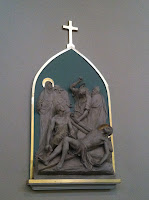As we spiritually gather around the base of the cross to witness Our Lord who has died for our sins, let us remember that this is what Christ's victory looked like. Let us not be afraid of what victory may look like in our own lives. How much time, thought and effort do we put into being successful in earthly things instead of heavenly things? Do we realize how often we must betray God in order to receive the affirmation of the World?
Lord, help us to remember and gain strength from Your crucifixion when the World has turned against us.
The Thirteenth Station: Jesus Is Taken Down from the Cross
The body of Jesus was taken down from the cross and laid in the lap of His mother. Michelangelo's famous Pieta depicts Mary in this scene as disproportionately large in relation to her son Jesus. She is powerful in that moment of profound distress. Jesus is our example of perfect humility in love and submission to the Will of God; Mary too is our example of humility expressed in her constant presence and indefatigable grace.
One of Jesus' last actions upon the cross was to entrust Mary to the keeping of John, and John to the keeping of Mary (John 19:26-27). We too have been entrusted to the care of our Mother Mary as a powerful intercessor before her son Jesus. Mary became the Mother of God through her exemplary acceptance of God's plan for her life; let us not forget that in the midst of our struggles we have been given so powerful an ally to call upon and from whom we may receive comfort and encouragement in the darkest hours. Who do we allow to teach us how to live a good and fulfilling life--the holy ones of God, or someone else? Do we have so much pride in our own ability to pray that we forget to ask others to pray for us?
Lord, help us to remember all the saints--and especially our Mother Mary--who stand ready to lift us up to God the Father.
The Fourteenth Station: Jesus Is Laid in the Tomb
The body of Jesus was placed in a tomb provided by Joseph of Arimathea. A great stone was rolled before the entrance, and a guard was placed before the stone. Few expected that the story of Jesus had not yet ended. Jesus had given them all they would have needed to keep hope alive through the whole ordeal. He knew, however, that words were not enough. He would rise from the dead and show His followers that the grave is not the place that the Father had prepared for them.
Lord, help us to always place our hope in You, unafraid of the mystery which the Father has in store for us.















